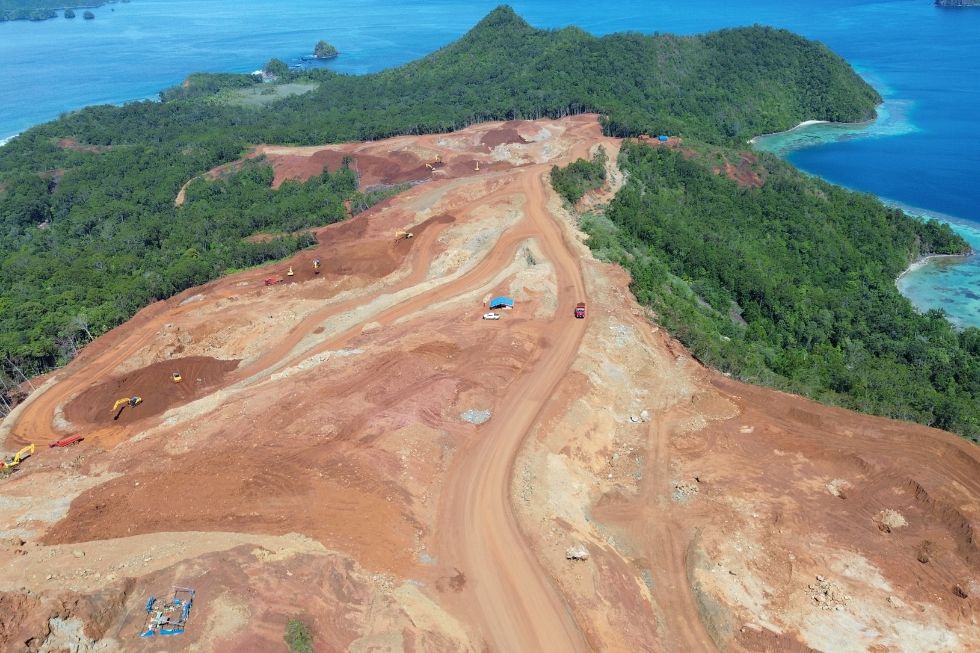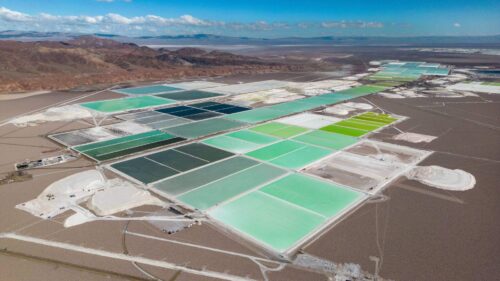Last week, Indigenous youth from eastern Indonesia disrupted a high-level mining summit in Jakarta to protest the destruction of their ancestral land. Holding banners reading “Nickel Mines Destroy Lives,” they delivered a stark message to a room full of powerful decision-makers: the global rush for “green” minerals is threatening their home, Raja Ampat. Their protest quickly went viral under the hashtag #SaveRajaAmpat. Within hours, several protesters were detained.
If you’ve never heard of Raja Ampat, you’re not alone. This remote archipelago in Papua, Indonesia, lies at the heart of the Coral Triangle, home to the richest marine biodiversity on Earth. Over 1,500 fish species, three-quarters of all known coral species, and countless fragile ecosystems thrive here. Indigenous Papuans rely on these waters and forests for food, identity, and survival.
But this ecological and cultural sanctuary is now under siege — from the very industry that claims to be building a cleaner, greener future: nickel mining. Indonesia holds the world’s largest reserves of nickel, a key ingredient in electric vehicle (EV) batteries. As demand for EVs soars, so does pressure to exploit these deposits. Chinese companies dominate Indonesia’s nickel supply chain, from financing to refining. But the environmental and human cost of this expansion falls disproportionately on communities least able to resist.
This year’s Indonesia Critical Minerals Conference & Expo, meant to celebrate the country’s rise as a key supplier for the global energy transition, instead revealed a darker truth: behind the optimism lies a growing backlash against extractive practices that destroy ecosystems, displace Indigenous peoples, and hollow out governance.
Raja Ampat is a prime example. Several mining operations have been approved in this ecologically sensitive region — including projects backed by Chinese capital. One company, PT Anugerah Surya Pratama, operates a 746-hectare mine on Manuran Island. Despite being located in a marine paradise, it was granted a permit by Indonesian authorities. Backed by investors with ties to China’s Vansun Group, the company has violated environmental regulations, clearing protected forests and discharging waste into the sea. An investigation by Indonesia’s Ministry of Environment confirmed these violations. The damage to marine life and local livelihoods is incalculable.
Yes, the Indonesian government recently revoked a handful of mining permits, including this one. But this move is too little, too late — and does not excuse the government’s deeper, systemic failures. Permits continue to be granted through opaque processes, with minimal oversight and rampant corruption. Environmental impact assessments are often rubber-stamped or ignored. Local communities are excluded from decisions that directly affect their lives. In short, the destruction of Raja Ampat is not an accident — it is a consequence of state negligence, if not complicity.
The primary blame lies with Indonesia. It is the Indonesian government’s duty to uphold environmental laws, respect Indigenous rights, and regulate the extractive industries it permits. That duty has been repeatedly abandoned in the pursuit of economic gain. No foreign company — Chinese or otherwise — could mine in Raja Ampat without an Indonesian license. Yet, the state has failed to protect one of its most precious natural and cultural treasures.
But Chinese actors cannot claim innocence. China plays an outsized role in Indonesia’s nickel economy. Its companies, banks, and state-owned enterprises are central to this supply chain. While the legal responsibility for enforcement lies with Indonesia, Chinese investors must also be held accountable for turning a blind eye to abuses they help finance. Profiting from weak regulations and corrupt systems doesn’t absolve them — it implicates them.
If China is serious about its global sustainability commitments — especially under the Belt and Road Initiative — it must extend those standards to its overseas projects. That means conducting rigorous due diligence, refusing to fund environmentally destructive ventures, and ensuring that Chinese-backed companies comply with international norms, not just the letter of local law.
Anything less makes China complicit in greenwashing. It also risks undermining the very legitimacy of China’s leadership in the global energy transition.
What’s happening in Raja Ampat is not just an Indonesian problem, or a Chinese one. It is a test case for whether the world can reconcile the clean energy transition with environmental justice. A green future that tramples on Indigenous rights and destroys biodiversity is neither sustainable nor ethical.
Indonesia must act decisively: not just by revoking permits after damage is done, but by overhauling its licensing processes, prosecuting environmental violations, and ensuring Indigenous communities have real power in land-use decisions. Protecting ecosystems like Raja Ampat is not a luxury — it is essential to climate stability, ocean health, and global biodiversity.
China, too, must step up. With its vast influence over the nickel industry and EV supply chains, it has the leverage to demand better. The question is whether it has the will.
Raja Ampat is not just a remote corner of Indonesia — it is a global treasure, and a frontline in the battle for a just energy transition. Coral reefs destroyed by runoff may take centuries to recover. Indigenous knowledge and culture, once uprooted, may never return. The cost of inaction is permanent loss.
The youth who protested in Jakarta were not just speaking for themselves. They were sounding an alarm on behalf of all of us. We would do well to listen — and act.
The views expressed in this article are the author’s own and do not necessarily reflect Fair Observer’s editorial policy.
Support Fair Observer
We rely on your support for our independence, diversity and quality.
For more than 10 years, Fair Observer has been free, fair and independent. No billionaire owns us, no advertisers control us. We are a reader-supported nonprofit. Unlike many other publications, we keep our content free for readers regardless of where they live or whether they can afford to pay. We have no paywalls and no ads.
In the post-truth era of fake news, echo chambers and filter bubbles, we publish a plurality of perspectives from around the world. Anyone can publish with us, but everyone goes through a rigorous editorial process. So, you get fact-checked, well-reasoned content instead of noise.
We publish 3,000+ voices from 90+ countries. We also conduct education and training programs
on subjects ranging from digital media and journalism to writing and critical thinking. This
doesn’t come cheap. Servers, editors, trainers and web developers cost
money.
Please consider supporting us on a regular basis as a recurring donor or a
sustaining member.
Will you support FO’s journalism?
We rely on your support for our independence, diversity and quality.










Comment